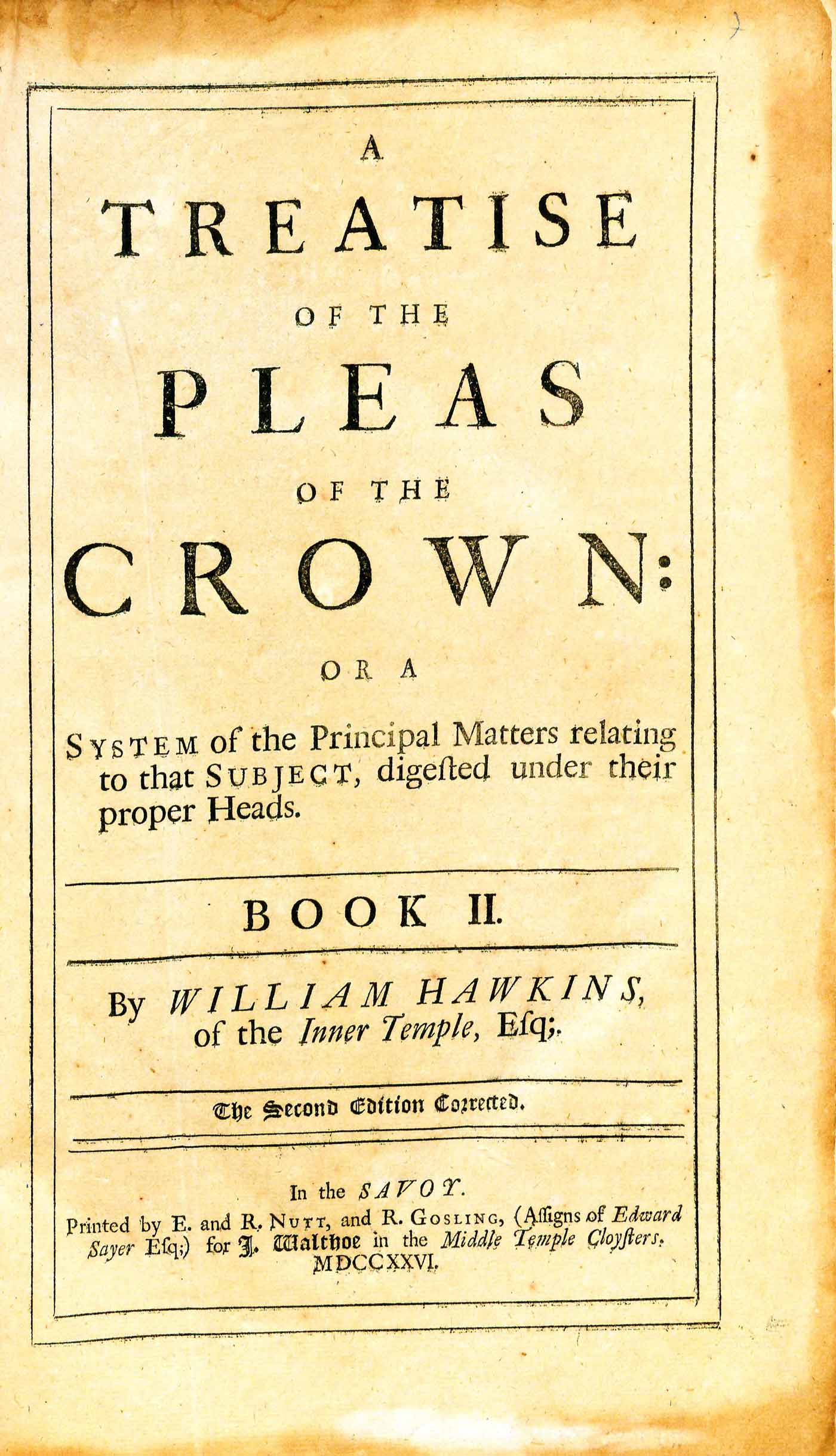Difference between revisions of "Treatise of the Pleas of the Crown"
| Line 1: | Line 1: | ||
{{DISPLAYTITLE:''A Treatise of the Pleas of the Crown''}} | {{DISPLAYTITLE:''A Treatise of the Pleas of the Crown''}} | ||
| + | <big>''A Treatise of the Pleas of the Crown, or, A System of the Principal Matters Relating to That Subject: Digested Under Their Proper Heads''</big> | ||
===by William Hawkins=== | ===by William Hawkins=== | ||
__NOTOC__ | __NOTOC__ | ||
| Line 5: | Line 6: | ||
|imagename=HawkinTreatiseOfPleasOfCrown1716-26v2.jpg | |imagename=HawkinTreatiseOfPleasOfCrown1716-26v2.jpg | ||
|link=https://catalog.swem.wm.edu/law/Record/554116 | |link=https://catalog.swem.wm.edu/law/Record/554116 | ||
| − | |shorttitle=A Treatise | + | |shorttitle=A Treatise of the Pleas of the Crown |
|vol=volume two | |vol=volume two | ||
|author=William Hawkins | |author=William Hawkins | ||
Revision as of 15:53, 27 January 2014
A Treatise of the Pleas of the Crown, or, A System of the Principal Matters Relating to That Subject: Digested Under Their Proper Heads
by William Hawkins
| A Treatise of the Pleas of the Crown | |
|
Title page from A Treatise of the Pleas of the Crown, volume two, George Wythe Collection, Wolf Law Library, College of William & Mary. | |
| Author | William Hawkins |
| Published | London: In the Savoy: Printed by Eliz. Nutt (executrix of J. Nutt, assignee of E. Sayer, esp;) for J. Walthoe and J. Walthoe, jun. |
| Date | 1716-26 |
| Edition | Second |
| Language | Greek |
| Volumes | 2 volume set |
A Treatise of the Pleas of the Crown was written by William Hawkins (1681-1750).[1] It represented an advancement in both analysis and in detail when compared to the last substantial exposition of English criminal law, written by Sir Edward Coke (1552-1634).[2] Hawkins is best known in the legal profession for this treatise, and some have gone so far as to suggest that it was Hawkins' principal qualification for the coif.[3]
Hawkins was admitted to the Inner Temple in 1700 or 1701; confusion exists due to another man on the records sharing his name.[4] In 1707 Hawkins was called to the bar, he later served as deputy chief justice of the Brecon circuit in 1719, and in 1724 he advanced to the rank of serjeant-at-law.[5] He started writing on legal matters in 1711, and in addition to the aforementioned treatise, he also wrote an abridgement of Coke upon Littleton, and a new edition of the Statutes at Large.[6]
Evidence for Inclusion in Wythe's Library
Listed in the Jefferson Inventory of Wythe's Library as Hawkin's P. C. fol. and given by Thomas Jefferson to Dabney Carr. We do not know which edition Wythe owned. The Brown Bibliography[7] includes the first edition while George Wythe's Library[8] on LibraryThing indicates "Precise edition unknown. Folio editions (in two volumes) were published at London in 1716-21, 1724, 1739 and 1762."
Description of the Wolf Law Library's copy
View volume one and volume two of this book in William & Mary's online catalog.
External Links
References
- ↑ J. H. Baker, "Hawkins, William (1681/2–1750)" in Oxford Dictionary of National Biography (Oxford University Press, 2004- ), accessed Oct. 12, 2013]
- ↑ Ibid.
- ↑ Ibid.
- ↑ Humphry W. Woolrych. Lives of Eminent Serjeants-at-Law of the English Bar (Wm. H. Allen & Co, 1869), 513.
- ↑ Baker, "Hawkins, William."
- ↑ Ibid.
- ↑ Bennie Brown, "The Library of George Wythe of Williamsburg and Richmond," (unpublished manuscript, May, 2012) Microsoft Word file. Earlier edition available at: https://digitalarchive.wm.edu/handle/10288/13433
- ↑ LibraryThing, s. v. "Member: George Wythe," accessed on September 16, 2013, http://www.librarything.com/profile/GeorgeWythe
